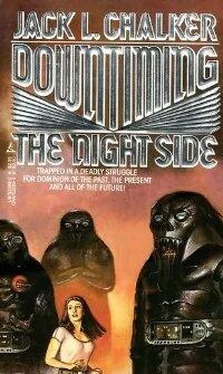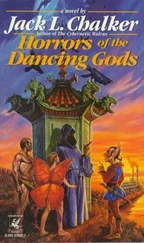Jack Chalker - Downtiming the Night Side
Здесь есть возможность читать онлайн «Jack Chalker - Downtiming the Night Side» весь текст электронной книги совершенно бесплатно (целиком полную версию без сокращений). В некоторых случаях можно слушать аудио, скачать через торрент в формате fb2 и присутствует краткое содержание. Год выпуска: 1985, ISBN: 1985, Издательство: Tor Books, Жанр: Фантастика и фэнтези, на английском языке. Описание произведения, (предисловие) а так же отзывы посетителей доступны на портале библиотеки ЛибКат.
- Название:Downtiming the Night Side
- Автор:
- Издательство:Tor Books
- Жанр:
- Год:1985
- ISBN:0-812-53288-0
- Рейтинг книги:3 / 5. Голосов: 1
-
Избранное:Добавить в избранное
- Отзывы:
-
Ваша оценка:
- 60
- 1
- 2
- 3
- 4
- 5
Downtiming the Night Side: краткое содержание, описание и аннотация
Предлагаем к чтению аннотацию, описание, краткое содержание или предисловие (зависит от того, что написал сам автор книги «Downtiming the Night Side»). Если вы не нашли необходимую информацию о книге — напишите в комментариях, мы постараемся отыскать её.
Downtiming the Night Side — читать онлайн бесплатно полную книгу (весь текст) целиком
Ниже представлен текст книги, разбитый по страницам. Система сохранения места последней прочитанной страницы, позволяет с удобством читать онлайн бесплатно книгу «Downtiming the Night Side», без необходимости каждый раз заново искать на чём Вы остановились. Поставьте закладку, и сможете в любой момент перейти на страницу, на которой закончили чтение.
Интервал:
Закладка:
Karl Marx was a striking figure in person. Although thin, he had an athlete’s build and broad shoulders that gave the impression of great mass and strength. His carriage was strong and upright, the body of a much younger man than his fifty-seven years. It was clear that his trip had done him much good; he looked excellent for any age.
He had a large brow framed by curly, white locks that reached to his powerful shoulders, a snow-white beard that flowed deep down, and brown eyes that sparkled with warmth and intelligence from underneath black, bushy eyebrows. The eyes, in fact, were a giveaway that did not generally reveal itself in photographs. They were warm, human, emotional eyes, highly expressive and penetrating at one and the same time. He was full of what the Greek called charisma —both visitors involuntarily stood up and waited in awed silence when he entered the room, not just from politeness but from the strength and magnetic power he radiated without doing or saying a thing.
He had changed into informal black pants, a white shirt, and had obviously thrown on an old smoking jacket for the visitors.
If Marx more than lived up to what the visitors expected to see, they certainly lived up to Helene Demuth’s description in his own mind. In his hand he held the envelope they had handed to the housekeeper, its top now torn open. “So,” he said in an orator’s baritone that more than fit his striking appearance, “vat in hell is the meaning of this?” He held up the envelope and shook it for emphasis.
His speech was heavily accented, and somewhat hesitant. Although he spoke, read, and wrote a half-dozen languages with ease, it was clear that he was not blessed with the translator’s talent of thinking in the tongue he was using. Everything, although extremely quickly, was translated into German in his mind and then back again when he spoke.
“If y’ please, sir,” said the woman, “that is, as y’ must know, the title and first few pages of yer rev’lut’nary book in the French and Russian tongues, along with some words from a letter y’ haven’t yet mailed to yer Russian friend.”
“I am veil avare of the content, young lady,” Marx responded coldly. “I vish to know how it is possible for you to know a letter I am writing still, and vhy somevun vould to the trouble go of printing up pages of books not yet published. Und Russian, yet! Vhen it is possible to Russian publish, they vill still be too stupid to read it!”
“They’re for real, sir,” she assured him, somewhat shocked by his rather anti-Russian scorn. “It was the only way to show you we ain’t what we seem, sir.”
The massive brows came down. They were all still standing. “Und, just vat ’ain’t’ you, then?” he responded scornfully.
She blushed, feeling ashamed of her dialect. In point of fact, it was taking an extreme amount of will to take the lead in this conversation at all. Her upbringing and background was as deferential and passive as Sandoval’s had been commanding and assertive. Clearly, whatever laws of time there were had moved hardest on Roberto Sandoval, to quench his fanatical personality and impulsive amorality. Time had contrived to make it difficult for someone to make tiny ripples even if they desired to make great waves. There was clearly a war of wills going on between what time had imposed and the strong-willed fanatic who’d stop at nothing—and, to Moosic’s surprise and grudging respect, Roberto Sandoval was winning. Clearly, whoever had planned this had chosen well indeed—but, then, why the empty-headed accomplice?
The beat cop came down the street at this moment, causing the listener to have to move away and crouch flat in the darkness to avoid being seen. The cop stopped by the wagon and inspected it warily, then looked right at the Marx household. For a few precious minutes Moosic dared not move, fearful that the cop would come up to the house to see just who would be visiting in that kind of vehicle at this time of the evening. Indeed, the cop seemed to be mulling over whether or not to do just that. Moosic prayed that he would not, for there was no clear exit off the porch without coming into full view of the cop, and he was certain to be spotted now—him with a revolver in his pocket!
The bobby finally decided on a middle approach, walking on down the street but walking with frequent glances back at the cart and horse. Clearly, he was not going to go far until he saw the owners.
The cop finally was far enough down to allow him to cautiously return to his listening post. He had no idea what had gone on in the few minutes he’d missed, but clearly Sandoval had been convincing.
“…You must understand,” Marx was saying, “that vat you say is true is the one total und horrible negation of my laws. If a device truly exists that can make changes in history, und such a device vould be qvite naturally in the hands of the capitalists, then the revolutionary process may be postponed indefinitely, even cancelled out after the fact! This is horrible, horrible! It is the same as if you came to a professor of physics und let go of an apple und it floats up to the ceiling!”
“It is exactly the point,” the woman responded, still in that lower class accent but with the grammar now seeming to smooth out. “The weapons of our toime can kill all livin’ things on Earth. The capitalists, then, must fall from within. But this—this is eternal slavery or the end of ’umanity!”
So that was it. More than enough to convince the committed, although it still didn’t explain Karen Cline.
“ Ja, ja. Or ve haff a time var, vith history obeying vatever laws one side makes up that the other cannot see.”
“We can destroy the place, kill the scientists, but it’ll do no good,” Sandoval told him. “They know ’ow. They’ll just build another bigger and better. So we busted in and brung the suits t’you.”
Moosic felt a shock run through him, and he almost cursed aloud. The two time suits were in the wagon! All he had to do was steal them or get at them long enough to destroy them and this would all be over! He looked back out at the street—and saw that damned copper standing over near where he’d hid out all day. “Alfie” calculated the odds, and decided there wasn’t a chance in hell of getting to that wagon and getting away with it unless he killed the copper. Just after that, all hell would break loose anyway.
So easy—it could have been so easy. If he’d shot the pair, that would have been the end of it, and only the guilty would have suffered. If he’d known, or guessed, that the suits were in the cart, he could have easily made off with it between the time they entered the house and the time the beat cop showed up, with nobody dead. Now, there was an innocent life at stake—and he couldn’t take that kind of chance. It was a long shot, sure, but killing the cop might change things worse than letting this run its course.
No chance to do it easy now. He waited for the cop to saunter on down the block once more, and then, when the coast seemed clear, he stood up and drew the revolver. He was standing just outside the living room window, which was chest-high at its base and had no screen this time of year. He peered in, saw the two radicals seated on a couch against the wall to his right, while Marx sat in an overstuffed armchair facing them. Steeling himself, he measured his moves and then counted down in his mind.
Suddenly he pushed up on the window and stuck the revolver inside. “All roite!” he commanded in Alfie’s less than elegant voice. “Everybody just stay still! This gun’s loaded and I know ’ow to use it!”
The three in the room froze, and it was Marx who dared the first move. “Now vat is dis?” he roared. “Who vould stick a gun in my parlor?’’ He was clearly more angry than scared.
Читать дальшеИнтервал:
Закладка:
Похожие книги на «Downtiming the Night Side»
Представляем Вашему вниманию похожие книги на «Downtiming the Night Side» списком для выбора. Мы отобрали схожую по названию и смыслу литературу в надежде предоставить читателям больше вариантов отыскать новые, интересные, ещё непрочитанные произведения.
Обсуждение, отзывы о книге «Downtiming the Night Side» и просто собственные мнения читателей. Оставьте ваши комментарии, напишите, что Вы думаете о произведении, его смысле или главных героях. Укажите что конкретно понравилось, а что нет, и почему Вы так считаете.












